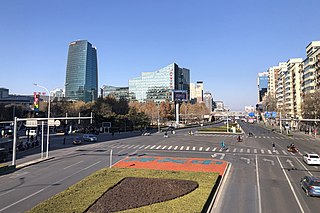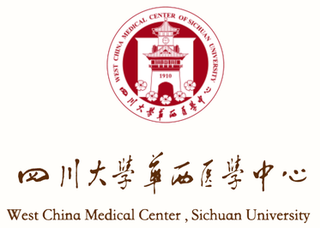
Traditional Chinese medicine (TCM) is an alternative medical practice drawn from traditional medicine in China. It has been described as "fraught with pseudoscience", with the majority of its treatments having no logical mechanism of action.

Hebei Medical University is a university in Shijiazhuang, Hebei, China, under the provincial government. It was established in 1894, making it one of the oldest, and is an AAA graded medical school in China.

Beijing University of Chinese Medicine is a public university in China. Founded in 1956, the Beijing University of Chinese Medicine is one of the first traditional Chinese medical institutions for higher learning in China. It is a traditional higher learning institution, Double First Class University and former 211 Project for national development. It is a Chinese state Double First Class University identified by the Ministry of Education.

Peking Union Medical College, founded in 1906, is a selective public medical college based in Dongcheng, Beijing, China. It is a Chinese Ministry of Education Double First Class University Plan university. The school is tied to the Peking Union Medical College Hospital and has a joint 8-year clinical medicine science program with Tsinghua University.

Zhongguancun is a major technology hub in Haidian District, Beijing, China.

Beijing No. 8 High School is a public beacon secondary school located in the Xicheng District of Beijing, China. With upwards of 99 percent of its graduating classes matriculating to China's most elite universities, and approximately one in five attending Peking University or Tsinghua University, BJBZH has been one of the best schools in the city for nearly a century. The school has a dedicated program for students who intend to pursue higher education abroad following graduation, which includes an intensive English language curriculum. The school also maintains regulation size athletic facilities, including soccer field, running track, underground athletic center, swimming pool, and several basketball courts, which were used as training and practice facilities during the 2008 Olympics.

Beijing, alternatively romanized as Peking, is the capital of the People's Republic of China. With over 21 million residents, Beijing is the world's most populous national capital city as well as China's second largest city after Shanghai. It is located in Northern China, and is governed as a municipality under the direct administration of the State Council with 16 urban, suburban, and rural districts. Beijing is mostly surrounded by Hebei Province with the exception of neighboring Tianjin to the southeast; together, the three divisions form the Jingjinji megalopolis and the national capital region of China.

Beijing Jishuitan Hospital (JST Hospital; simplified Chinese: 北京积水潭医院; traditional Chinese: 北京積水潭醫院), is a large public teaching hospital in Beijing, focusing mainly on orthopaedics and burn surgery. Founded in 1956, the hospital now has around 1000 beds. Its performance in medical care, teaching and researching led to it becoming the Fourth Medical College of Peking University. The hospital now has 200 doctors and 2200 other staff. The hospital has fully equipped departments of orthopaedics, spine surgery, adult joint reconstructive surgery, orthopaedic trauma, hand surgery, paediatric orthopaedics, bone tumor, sports medicines and burn surgery.
New Century International Hospital for Children, NCICH is a private, joint-venture, institution affiliated with the Beijing Children's Hospital at Beijing, next to the east gate of the Beijing Children's Hospital. The International Children's Hospital features services specifically designed for children and youth. In addition to full daily clinics in all of the major specialty areas, there are also focused programs in pediatric eye care and pediatric dentistry. This hospital has around 104 beds, including 95 beds for children and 9 beds for newborns. It has over 8,500 square meters building area, 24/7 emergency service, covered by many international and national insurance companies.

The China-Japan Friendship Hospital also abbreviated as China-Japan Hospital was established through the cooperation of the Chinese and Japanese governments during the 1980s. The hospital has been directly affiliated with China's Ministry of Health since its first day of operation, October 23, 1984. The hospital is located on East Yinghuayuan Street, Chaoyang District, Beijing. The hospital covers 9.7 hectares, with floorspace of facilities measuring 180,000 square metres (1,900,000 sq ft). Within the hospital, there are 1,500 beds, 58 departments, as well as a clinical research and education center. The hospital has intensive care and treatment of severe diseases as a primary focus and integrative eastern-western medicinal therapy as an additional area of expertise. The hospital often attends to the health care of senior officials from over 100 countries and regions.
The Nanjing University of Chinese Medicine, is located in Nanjing, capital of China's Jiangsu province. It is jointly constructed by the People's Government of Jiangsu Province and the State Administration of Traditional Chinese Medicine of the People's Republic of China. Established in 1954, NJUCM is one of the earliest established universities of Traditional Chinese Medicine in China. And 1st rank in Traditional Chinese Medicine university in China dedicated to the study of traditional Chinese medicine. It is a Chinese Ministry of Education Double First Class University, included in the state Double First Class University Plan.

The West China Medical Center, Sichuan University, formerly the West China University of Medical Sciences, is a prestigious world-class public research institution of medical sciences located in Chengdu, Sichuan, China.

The Children's Hospital of Fudan University is a national-level tertiary children's hospital in Shanghai, China. It is a university hospital affiliated to Fudan University Shanghai Medical College. The hospital is located in Minhang District with an outpatient clinic located in Xuhui District.
Chen Gang is a former Chinese politician. Best known for his term in Beijing beginning in 2006, Chen played a prominent role in constructing the venues of the Beijing Olympics and subsequent urban development projects. Elevated to the municipal standing committee in 2012, Chen seemed destined for higher office. However, he was abruptly moved to the North-South Water Transfer project in 2017. He was disgraced in 2019 and is currently under investigation for graft.

The World First Class UniversityandFirst Class Academic Discipline Construction, together known as Double First Class, is a tertiary education development initiative designed by the People's Republic of China central government in 2015, which aims to comprehensively develop elite Chinese universities into world-class institutions by the end of 2050 through developing and strengthening their individual faculty departments. The Double First-Class University Plan has made new arrangements for the Chinese higher education institution development. The universities included in this plan are called Double First Class Universities.
Ji Xiaocheng was a Chinese paediatrician who served as Director of Paediatrics at Peking Union Medical College Hospital. In the early 1980s, he introduced perinatal medicine to China from the United States, and co-founded China's first neonatal intensive care unit at PUMC Hospital.

The Beijing Xiaotangshan Recovery Hospital, also known as the Beijing Xiaotangshan Hospital, is a tertiary-level general hospital in Xiaotangshan Township, Changping District, Beijing, China, occupying approximately 33 hectares of land.

Ji Jiafu FACS, FRCS is a Chinese surgical oncologist and researcher specializing in gastrointestinal malignancy. He is a professor in gastrointestinal surgery at Peking University, the director of the Key Laboratory in "Malignancy Pathogenesis and Translational Research" under the Ministry of Education of the People's Republic of China, a fellow of the Chinese Academy of the Medical Sciences (CAMS), and a recipient of the Special Government Allowances of the State Council.
Li Wei is a former Chinese politician who served as vice chairman of the Beijing Municipal Committee of the Chinese People's Political Consultative Conference. He was investigated by China's top anti-graft agency in August 2020.
Yu Luming is a former Chinese politician. In April 2022, Yu was investigated by China's top anti-corruption agency, and in March 2023, Yu Luming was charged with bribery.














